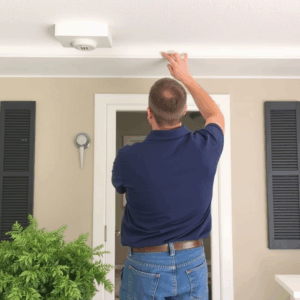When it comes to selling a property, especially one that has experienced fire damage, understanding who is responsible for smoke detector installation when a property is sold is critical. As per Smoke Detector Laws by State 2025, residential houses in the United States should have smoke detectors as part of the requirement; however, whether or not these rules apply during property sales depends on the different states.
Whether you’re selling a fire-damaged home or a fully restored property, staying informed can help you avoid potential pitfalls and ensure a smooth transaction.
Why Are Smoke Detectors Mandatory?
In the home states of America, fires remain a major cause of damage to property as well as casualties. One of the early-warning devices is smoke detectors, which ensure lives are saved and damage is minimal. Functional smoke detectors are not only legal requirements but also essential in restoring buyer confidence in case property is being sold, especially for sellers of fire-damaged properties.
Statistics emphasize their importance. For example, the U.S. Fire Administration reports that over 72% of fire-related fatalities occur in residential fires. An operative smoke alarm can cut the risk of death by 50% or more. This shows us that making sure smoke detector laws are complied with is the preservation of lives rather than just closing a deal for property.
Who Is Responsible for Smoke Detector Installation When a Property Is Sold?
Seller’s Responsibility
In most states, who is responsible for smoke detector installation when a property is sold falls primarily on the seller. Generally, operational smoke detectors have to be part of the process since most states ask for seller verification before ownership transfer. There are some states, like California and Florida, that even have specifications as to what type should be used, like 10-year sealed battery models.
For example:
- California laws demand smoke detectors in all bedrooms and hallways of single-family homes and multi-unit dwellings. Sellers cannot list homes without meeting these requirements.
- Massachusetts requires a passed smoke detector inspection certificate from the local fire department before the sale.

Buyer’s Responsibility
After the home sale is complete, the responsibility typically shifts to the buyer for maintaining and replacing smoke detectors. Nonetheless, selling compliance with smoke detector laws ought to be verified by the buyer at the very outset of negotiations. For example, fire-damage buyers should make sure that detectors are not only installed, but in working order as well.
By clearly defining who is responsible for smoke detector installation when a property is sold in the purchase agreement, both parties can avoid misunderstandings about safety compliance.
Legal Penalties for Non-Compliance
There can be dire consequences when smoke detector laws are disregarded. The seller could face penalties or be subjected to litigation in the event of a fire if it should become apparent that the property was sold without functioning alarms. Most lenders and insurers demand proof of compliance before granting a mortgage or policy.
For instance:
- Some states impose penalties on sellers for neglecting to provide proof of properly installed detectors.
- Insurance claims may be denied if a home fire occurs in a property missing mandated safety equipment.
Selling a property without addressing smoke detector requirements isn’t just risky; it also significantly reduces the property’s appeal to qualified buyers.
Benefits of Smoke Detectors in Real Estate Sales
Boost Property Value
Properly installed smoke detectors and other fire safety installations may even add perceived value to property. This will entice more buyers into being willing to pay premium prices for these homes, which offer peace of mind and level standards of safety.
Streamlined Sales Process
Properties that meet local smoke detector requirements are more likely to pass inspections, leading to fewer delays and smoother closings.
Positive First Impressions
For fire-damaged homes, visible safety upgrades like smoke detectors signal a seller’s effort to fully restore the property. This can overcome buyer hesitations and build trust.
Navigating smoke detector obligations is a crucial part of selling any home, especially those with a history of fire damage. Knowing who handles smoke detector installation during a property sale ensures legal compliance, saves lives, and boosts buyer confidence.
Previous